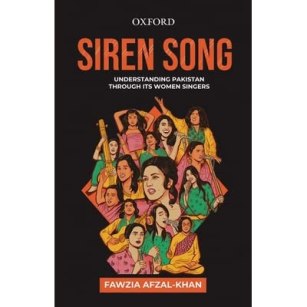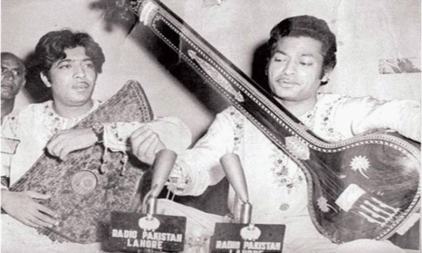This review was originally published in SAMAJ on July 19, 2022.
 As a student of ethnomusicology trained in Hindustani classical music, I was intrigued by Fawzia Afzal-Khan’s latest book Siren Song: Understanding Pakistan Through Its Women Singers. Afzal-Khan – a professor of English and Gender Studies in the United States as well as a vocalist trained in the Hindustani tradition – uses case studies of selected female singers to explore some of the contradictions of Pakistani society. On the one hand, Pakistan is a conservative Muslim-majority state where many people believe that the performing arts in general are contrary to religious injunctions and that women singers are not “respectable” women. Yet, divas “Madam” Noor Jehan (1926-2000) are widely celebrated and have legions of fans. Afzal-Khan thus wanted to provide a more nuanced depiction of Pakistani society at a time when many people in the West have a very stereotypical image of Muslims and particularly of Muslim women, whom they believe lack all personal agency and are completely covered by the burqa. Clearly, the truth is not that simple. In this book, Afzal-Khan explores the ways in which great singers like Malka Pukhraj (1912-2004), Roshan Ara Begum (1917-1982), and Noor Jehan employed their personal agency within the constraints of a conservative Islamic society to fulfill their ambitions to become performing artists.
As a student of ethnomusicology trained in Hindustani classical music, I was intrigued by Fawzia Afzal-Khan’s latest book Siren Song: Understanding Pakistan Through Its Women Singers. Afzal-Khan – a professor of English and Gender Studies in the United States as well as a vocalist trained in the Hindustani tradition – uses case studies of selected female singers to explore some of the contradictions of Pakistani society. On the one hand, Pakistan is a conservative Muslim-majority state where many people believe that the performing arts in general are contrary to religious injunctions and that women singers are not “respectable” women. Yet, divas “Madam” Noor Jehan (1926-2000) are widely celebrated and have legions of fans. Afzal-Khan thus wanted to provide a more nuanced depiction of Pakistani society at a time when many people in the West have a very stereotypical image of Muslims and particularly of Muslim women, whom they believe lack all personal agency and are completely covered by the burqa. Clearly, the truth is not that simple. In this book, Afzal-Khan explores the ways in which great singers like Malka Pukhraj (1912-2004), Roshan Ara Begum (1917-1982), and Noor Jehan employed their personal agency within the constraints of a conservative Islamic society to fulfill their ambitions to become performing artists.
Afzal-Khan utilizes a framework resting on feminist and performance theory. In the Introduction, she defines the book’s objective : “…my aim is to provide interested readers with a sense of Pakistan’s cultural history from a different perspective than that extolled by official state narratives, as well as from orientalist accounts of ‘oppressed Muslim womanhood’ that circulate ad nauseam in Western media; in other words, a ‘herstorical account from below’, utilizing women singers as the key heuristic site from whence to develop this alternative reading…” (xviii). She elaborates on this objective as follows: “I am interested less in the sociology of women singers’ lives, than in tracing the ways in which these singers’ performances ‘create cultural representations of gender identities’; representations that issue challenges to embedded cultural gender norms of Pakistan” (xviii).
Afzal-Khan situates her methodology within the discipline of cultural studies and describes her theoretical orientation as a “postcolonial feminist cultural studies approach” (xix). She uses this approach in order to “understand the imbrication of issues of gender, class, religion, and postcolonial state history as they have impacted the lives and work not only of the women singers of Pakistan but also of their audiences, in a constantly evolving exchange that reflects or is shaped by shifting societal pressures and values; and, in turn, shapes and alters these same values and attitudes” (xx). Continue reading “Review: Siren Song: Understanding Pakistan Through Its Women Singers by Fawzia Afzal-Khan”

 Regular readers of this blog will know that I am a big fan of thrillers and particularly of dark academia. Donna Tartt’s
Regular readers of this blog will know that I am a big fan of thrillers and particularly of dark academia. Donna Tartt’s